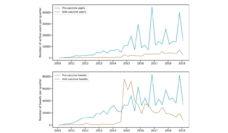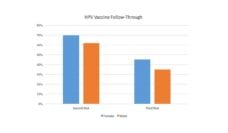No major world religion explicitly forbids vaccination. In fact, many religions encourage it. Despite this, the number of families taking advantage of religious exemptions for childhood vaccination has markedly increased since 2009. Multiple states have attempted to improve vaccination rates by removing personal belief exemptions, but this policy change has, sometimes paradoxically, caused a further rise in religious exemptions.
As herd immunity wanes, fewer members of a community have protection against dangerous infections, vaccine-preventable diseases return. Pertussis is a vaccine-preventable disease, and yet California had over 9,000 cases in 2010, the worst outbreak in over 60 years. In 2019, the US experienced its worst measles outbreak in over 25 years, the origins of which were traced back to orthodox Jewish communities in New York with low vaccination rates.
As a result of recent and worsening outbreaks, states are reconsidering both religious and personal belief exemptions, collectively referred to as nonmedical exemptions. California removed all nonmedical exemptions in 2016. Sindiso Nyathi and colleagues calculated the effect of the policy change on the rate of childhood vaccinations and exemptions. They found that the policy change was responsible for a 3.3% increase in vaccination, a 2.4% decrease in nonmedical exemptions, and only a 0.4% increase in medical exemptions statewide. Vaccination rates improved by 26% in Trinity County, an area with dangerously low coverage prior to the policy change.
The percent changes may seem slight, but small fluctuations in vaccination rates can make or break herd immunity which, in the case of measles, relies on 95% of the population having been vaccinated. In multiple states, nonmedical exemption rates are well above 5%, threatening immunocompromised individuals and infants too young to be vaccinated.
Therefore, policies granting exemptions have more to consider than individual liberty. The lack of doctrinal support to keep religious exemptions, combined with evidence of improved vaccination rates after the removal of nonmedical exemptions, may strengthen legal precedence for policy change across states.
Maine, Mississippi, New York, and West Virginia have also eliminated all nonmedical exemptions for children enrolling in public schools. Some states are exploring policy options that retain an individual’s perceived right to opt out of vaccination but make it more difficult to obtain. In Massachusetts, the complete removal of religious exemptions has faced backlash from the anti-vaccine community, so the state has instead introduced a bill that, if passed, would retain the opportunity for exemption but improve the tracking of school vaccination and exemption rates.
Along with US jurisprudence, religious institutions favor public protection from infectious disease even when considering individual beliefs or liberties. For example, although multiple religions express misgivings about different vaccine ingredients, including misconceived objections to the use of cells from aborted fetuses or non-halal ingredients such as gelatin, many have been clear to make exceptions if there is no alternative to the concerning vaccine. Religious leaders encourage members to vaccinate their children, stressing the higher moral obligation to protect the health of the community.
Families who claim religious or personal belief exemptions benefit from the widespread immunity among their neighbors yet simultaneously threaten its integrity. The consequences of an individual choice to forego vaccination are not limited to the person making that choice. Therefore, policies granting exemptions have more to consider than individual liberty. The lack of doctrinal support to keep religious exemptions, combined with evidence of improved vaccination rates after the removal of nonmedical exemptions, may strengthen legal precedence for policy change across states.
Photo via Getty Images














